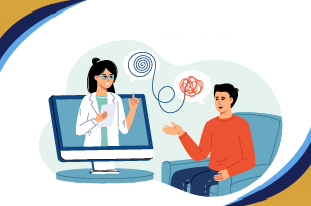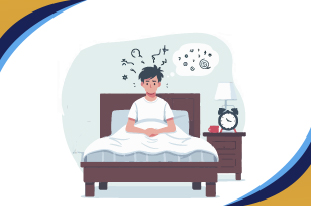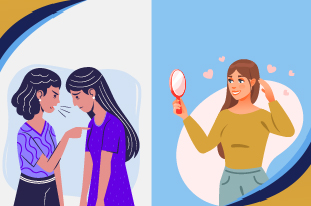Understanding OCD and Eating disorders is not an easy job, as it can confuse many people as one disorder without knowing the underlying differences these both possess. OCD is a mental disorder that involves specific thoughts a person cannot control and some behaviors they cannot resist. And on the other hand, eating disorders are illnesses associated with food and body shape.
But how are they connected?
This blog post is a perfect guide to understanding the potential differences between these different mental health issues, can ocd cause eating disorders, does ocd cause eating disorders, some common ocd eating habits, what is ocd compulsive eating, and how ocd and eating habits are linked.
What is OCD?
OCD is an overwhelming mental health issue that revolves around constant, provoking thoughts and impulses that require urgent action to be performed to get rid of the negative impact and distress.
Common Symptoms of OCD:
Some common identifiers of OCD are as follows:
- Obsessions: Persistent thinking about unwanted things that are unwanted or provoke distress, mood disorder, depression, and anxiety. These may be contamination, harmful, pure perfectionism, or moral thoughts.
- Compulsions: Inappropriate or excessive thoughts, images, or impulses that occur repeatedly in the individual’s mind and are well known to cause distress. They may include a preoccupation with ordering, washing, ringing, touching, counting, questioning, or ordering.
Example:
Such a person with OCD may always be compelled to wash hands or clean surfaces as they believe germs are dangerous and will sicken them if encountered. As a result, they will start washing their hands several times a day till their skin becomes brittle, as if it has turned raw.
What Is An Eating Disorder?
Eating disorder entails unhealthy concerns with eating food, body weight, and shape. This occurs at the cognitive, affective, and behavioral levels regarding food, resulting in adverse consequences for a person’s health.
Common Types of Eating Disorders:
- Anorexia Nervosa: An intense limitation of energy intake leading to substantially low body weight and a dread of becoming fat.
- Bulimia Nervosa: A repeated pattern of eating a large amount of food and then trying to rid the body of the consumed food by vomiting or exercising.
- Binge Eating Disorder: Consuming a relatively high quantity of food in a brief period while not experiencing control over eating, afterward experiencing shame or guilt, yet not purging.
Example:
People with anorexia always measure how many calories they take, and they pinch meals, thinking they are always likely to gain weight. A person with bulimia may take part in eating massive quantities of food in secret and then purging the food to prevent weight gain.
What is the relationship between OCD and Eating Disorders?
Both include the behavior rituals referred to as obsessions and compulsions, although they have distinct content. Those with OCD may tend to have obsessions of contamination, chemicals, and germs or when they will be spared or when they will die, whereas individuals with eating disorders focus on food, calories, weight, or shape, respectively.
Symptoms of OCD can help instigate an eating disorder in some people, especially if the obsessions and related compulsions fixate on eating habits and body image. Likewise, the more the person with an eating disorder becomes conscious about the eating issues, they could start developing other symptoms related to OCD.
- Obsessive Thoughts And Eating
Eating disorders can be one with OCD in that the central fixation in both conditions is related to food and body shape. For instance, if the person has OCD, they will develop an extreme fear associated with food contamination. They may, for example, begin to stop eating certain foods to prevent anxiety or reduce their dietary intake to a bare minimum. In the long run, it can develop into an eating disorder, for example, anorexic or even orthorexic, a condition that compels one only to take ‘clean’ or ‘healthy foods.’
On the other hand, a person who has an eating disorder might get fixated on calorie intake or body structure. These thoughts can come into their mind as quickly as OCD obsessions go into an individual’s mind and create compulsive behaviors such as counting calories, restricting food intake, and excessive exercising.
- Perfectionism and Control
OCD and eating disorders are alike in that both can be the result of wanting to establish control and perfection. The simple fact is that OCD can make sufferers feel like they are ‘forced’ into routine and ‘forced’ to perform certain rituals that will ensure that something catastrophic does not occur. In the same way, the sufferer also thinks identically about food and how they earn their living; they need to reduce or increase food intake and body complications to match the standard they have set despite being unhealthy.

For example, an applicant suffers from obsessive-compulsive disorder, and they can’t eat without ordering the food in a particular manner. A person with an eating disorder can construct rigid protocols that countries what and when to eat, even if it stresses their body.
- Shared Risk Factors
Genes and other similar risk factors can lead to the development of eating disorders and OCD. Understanding these shared factors can help explain why the two conditions often co-occur:
- Genetics: As in the case of OCD, many people seem to have inherited susceptibilities to eating disorders; some are simply born with a greater vulnerability to such illness by their genes.
- Trauma or Stress: Children who are sexually abused, learners who are bullied, or family members who lose a loved one may develop OCD or an eating disorder as a result of stress.
Treatment Options For OCD And Eating Disorders
The good thing is that both OCD and eating disorders are diagnosable, and therefore, patients can seek medical help. It is possible to use various approaches to help the patient learn how to handle their symptoms and start living the desired life.
-
Cognitive Behavioral Therapy (CBT).
The most efficacious treatment for both OCD and Eating disorders is Cognitive Behavioral Therapy, abbreviated CBT. CBT involves assisting a person to recognize their obsession and how they respond to anxiety by teaching them other acceptable behaviors.
For OCD, CBT may involve ERP, in which the patient is exposed to the source he feels anxious about but cannot perform the compulsion. In eating disorders, CBT majorly intervenes with negative cognitions about foods and body shape and improves eating plans.
-
Medications
At times, medications are prescribed, such as Selective Serotonin Reuptake Inhibitors (SSRIs), to alleviate the symptoms of obsessive thinking in OCD and eating disorders in a conducive manner. These medications are thought to act by increasing the amount of the chemical serotonin in the brain, which can affect mood and decrease obsessive thinking.
-
Nutritional Counseling
In treating people with eating disorders, it is natural for them to have proper nutrition counseling to sort out their complications with foods. The disease may be managed with the help of a registered dietitian who can advise the patient on choosing food that will not make them afraid of eating but will provide all the necessary nutrients.
-
Support Groups
Support groups can help patients find people who can listen and share information concerning their problems. Peer support is critical, especially when recovering because people are encouraged and feel they are being counted on to do a particular activity.
Conclusion: Breaking the Vicious Cycle
Obsessive Compulsive Disorder and eating disorders are not the same, but they are intertwined, and understanding how they are related can help us find the way out. Both disorders are a result of anxiety, the need for control, and the constant presence of obsessive thoughts and compulsive behaviors that dominate a person’s life.
People can be taught how to contain their symptoms and change pathogenic beliefs and behaviors with appropriate therapies. When individuals with OCD and eating disorders ask for help, they can take their power back and start the process of healing. If you or any of your loved one is suffering from ocd and eating disorders, then now is the best time to consult Telehealth services of Orange Coast Psychiatry today!
























